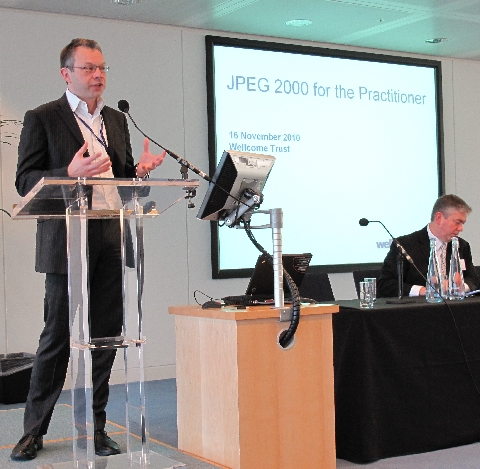DPC
Assessing long term access from short term digitization projects
Appropriate and timely examination of the digital preservation plans of digitization projects can have a lasting impact. Projects may not know or understand the risks they run. Simple assessment can help them identify and address these risks sooner rather than later.
Assessing long term access from short term digitization projects
Appropriate and timely examination of the digital preservation plans of digitization projects can have a lasting impact. Projects may not know or understand the risks they run. Simple assessment can help them identify and address these risks sooner rather than later.
Digitization projects often - and sensibly - start by establishing and meeting the needs of a modern user community and are mostly funded over a short term. But the outputs from digitization projects are likely to be valuable in the long term, so how can we take steps to make the outputs of digitization robust in the long term? This case note reports some work undertaken by the University of London Computer Centre in assessing the long term plans of 16 digitization projects, providing a basic survey tool to help funders and project managers alike to relfect on the long term preservation plans.
DPC draft response to DCMS's consultation on legal deposit: comments welcome
Added on 6 December 2010
Comments are sought on the DPC's draft response to the DCMS's consultation on the regulations for Legal Deposit of electronic materials. The draft response is online at: http://www.dpconline.org/advocacy/direct-advocacy/dpc-response-to-electronic-legal-deposit [pdf, login required] Comments are requested by Monday 13th December.
In January 2010 the Department for Culture Media and Sport (DCMS) consulted on draft regulations for the legal deposit of ‘free of charge’ electronic publications – the ‘free web’. This consultation was intended to be the first part of a two part process and the DPC responded arguing inter alia that the second phase of proposals be presented without delay as arguably the ‘paid web’ includes material of lasting value and that until regulations were introduced this element of our collected digital memory would be at risk.
JPEG 2000 for the Practitioner
 Introduction
Introduction
A free seminar to explore and examine the use of JPEG 2000 in the cultural heritage industry was held at the Wellcome Trust. The seminar included specific case studies of JPEG 2000 use. It examined technical issues that have an impact on practical implementation of the format, and explored the context of how and why organisations have chosen to use JPEG 2000. Although the seminar had an emphasis on digitisation and digital libraries, the papers are relevent to a range of research and creative industries. Places were limited to 80 attendees and papers are now available online.
Christy Henshaw of the Wellcome Library has written a short report of the event.
This event was hosted by the JPEG 2000 Implementation Working Group and the Wellcome Library with assistance from the DPC.
Programme and Presentations
09:00 Registration, coffee
10:00 Welcome and Introduction Christy Henshaw Chair of JP2K-UK and Simon Chaplin, Wellcome Library,
Morning session Chair: William Kilbride, Executive Director, Digital Preservation Coalition
10:10 What did JPEG 2000 ever do for us? [pdf] Simon Tanner, Director, Kings Digital Consultancy Service
10:40 JPEG 2000 standardization - a pragmatic viewpoint [pdf] Richard Clark, UK head of delegation to JPEG and MD of Elysium Ltd.
11:10 JPEG 2000 profiles Three short presentations moderated by Sean Martin, Head of Architecture and Development, British Library
(see also chart comparing different profiles from institutions [pdf])
-Sean Martin, British Library JPEG 2000 profile [pdf]
-Christy Henshaw, Wellcome Library JPEG 2000 profile [link]
-Bedřich Vychodil, JPEG 2000 Specification of the National Library of the Czech Republic [pdf]
12:10 IIPImage and OldMapsOnline Petr Zabicka, Head of R&D, Moravian Library, Czech Republic
12:40 LUNCH
Early afternoon session Chair: Simon Tanner, Director, Kings Digital Consultancy Service
13:40 JP2K for preservation and access, experiences from the National Library of Norway [pdf] Svein Arne Brygfjeld, National Library of Norway
14:10 Practical usage of JP2 files with presentational web interface [link] Sasa Mutic, General Director, Geneza and Ivo Iossiger, General Director, 4DigitalBooks, Switzerland
14:40 JPEG 2000 for long-term preservation in practice: problems, challenges and possible solutions [pdf] Johan van der Knijff, Koninklijke Bibliotheek (NL)
15:10 Coffee
Late afternoon session Chair: Dave Thompson, Digital Curator, The Wellcome Librray
15:40 Delivering High-Resolution JPEG2000 Images and Documents over the Internet [pdf] Gary Hodkinson, MD of Luratech Ltd.
16:10 Pros and Cons of JPEG 2000 for video archiving Katty Van Mele, IntoPIX
16:40 Questions and discussion Moderated by Ben Gilbert, Photographer, Wellcome Library
17:10 Concluding remarks
Practical Preservation: West Yorkshire Archive Service accepts a digital collection
Nobody has the perfect answer to digital preservation for every case. If we try we may fail; if we don’t try we will certainly fail.
Practical Preservation: West Yorkshire Archive Service accepts a digital collection
Nobody has the perfect answer to digital preservation for every case. If we try we may fail; if we don’t try we will certainly fail.
Digital Preservation can be intimidating for organizations which have previously been used to managing and collecting paper archives. In this case note, staff from West Yorkshire Archives Service report on their experience in taking their first large digital archive. This made them confront new problems and new ways of working, they conclude that If we try we may fail; if we don’t try we will certainly fail.
Small Steps - Long View: how a museum service turned an oral history headache into an opportunity
The benefits of digital preservation can be expressed in terms of new opportunities they create in the short and long term. Even relatively simple steps can bring early rewards if properly embedded within the mission of an organization.
Small Steps - Long View: how a museum service turned an oral history headache into an opportunity
The benefits of digital preservation can be expressed in terms of new opportunities they create in the short and long term. Even relatively simple steps can bring early rewards if properly embedded within the mission of an organization.
This case note examines Glasgow Museums' approach to its large and growing digital collections. It describes how some simple steps in addressing digital preservation have created short and long term opportunities for the museums. They used some very traditional simple and well know approaches - creating an inventory, assessing significance and promoting access - as the basis for building confidence to manage the wider challenges they face.
New Case Note Released: practical preservation at West Yorkshire Archive Service
Added on 27 October 2010
The DPC, JISC and West Yorkshire Archive Service are delighted to announce the release of a new digital preservation case note which examines the practical problems of digital preservation faced by West Yorkshire Archive Service as they negotiated and received their first large digital collection. They conclude that although digital preservation can seem daunting and although nobody has the perfect answer to digital preservation for every case, that if we try we may fail but if we do nothing we certainly will.
The case note will be released at the end of October: a member's preview of the Case Note is available here (login required).
Preserving Email: Directions and Perspectives
Email is arguably the most ubiquitous, inexorable and voluminous manifestation of information technology. It is a defining characteristic of our age and a critical element in all manner of communications and transactions. Industry and commerce depend upon email; families and friendships are sustained by email; government and economies rely upon email; communities are created and strengthened by email. It is sometimes hard to remember how we functioned before the widespread adoption of email in public and private life. But for all the importance of email and the transactions it supports, it is surprisingly absent from much of the digital preservation literature. Institutions, organizations and individuals have a considerable investment and in many cases statutory requirements to safeguard large collections of email, so there ought to be a strong body of experience and clear workflows to follow. So why is there so little detailed advice available?
To some extent email encapsulates many of the core challenges of digital preservation. It would be simple to preserve if it were not for the infinite variety of attachments that go with it; it would be simple to preserve if we could eliminate all the duplicates and spam; if we could remove all the personal details; if we could resolve the copyright issues; if we could resolve access and security barriers. These and other subtle, complex demands mean that the relatively simple proposition of preserving our collected digital correspondence can be blighted by interminable wrangling over procedure, policy and technology. Nonetheless the preservation of email creates a readily understood basis to engage with the widest possible audience with digital preservation. It provides a pervasive environment for innovation and assessment of digital preservation tools and services. It will be a necessary component to ensure our digital memory is accessible tomorrow.
This DPC briefing day will provide a forum for members to review and debate the latest developments in the preservation of email. Based on commentary and case studies from leaders in the field, participants will be presented with emerging policies, tools and technologies and will be encouraged to propose and debate new directions for research. The day will include a discussion of key topics such as:
- lifecycle management of email
- Ingest, documentation and accession of email archives
- Emerging tools and policies for preservation of email
Who should come?
This day will be of interest to:
- Collections manager, librarians, archivists in all institutions
- Tools developers and policy makers in digital preservation
- Innovators and researchers in information policy and management
- Innovators and researchers in computing science
- Vendors and providers of email services
Draft Programme Outline
1030 Registration and Coffee
1100 Welcome and introductions (William Kilbride, DPC)
1105 The Nature of the Problem (Chris Prom, University of Illinois)
1135 Why preserving email is harder than it sounds - theory and practice (Stephen Howard, Information Management Officer, the United Nations)
1205 Receiving and managing email archives at the Bodleian Libraries - a case study (Susan Thomas, Bodleian Libraries)
1235 Discussion and questions
1245 Lunch
1330 Email management: 15 wasted years and counting (Steve Bailey, JISC InfoNet)
1355 Past, present and future in email preservation: practical experience and future directions (Maureen Pennock, British Library)
1420 Emerging tools for email preservation (Tom Jackson, Loughborough University)
1445 Discussion and questions
1500 Coffee
1515 Discussion and panel (led by Tim Gollins, TNA)
By 1600 Close































































































































